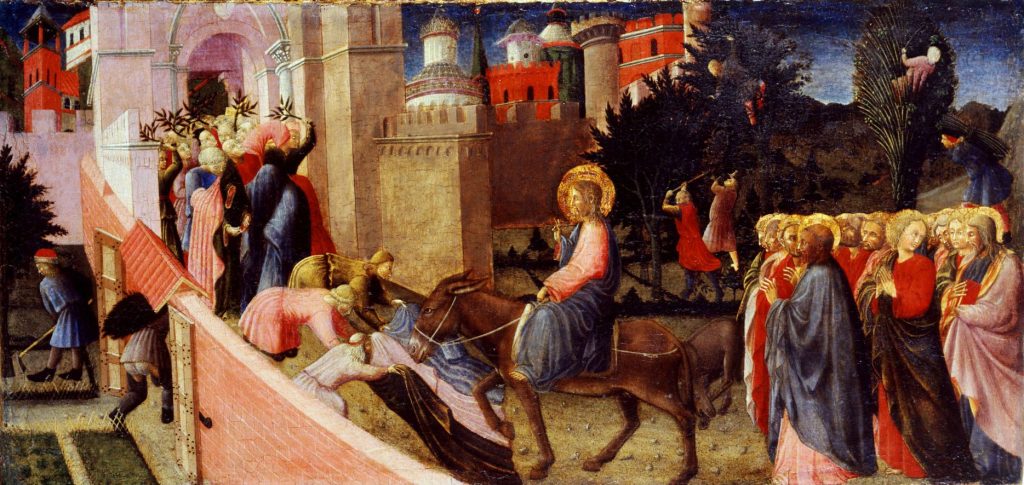Passion Sunday, “a bittersweet celebration”

Today, with the celebration of the Palm Sunday and Passion Sunday, we begin the Holy Week. And this Sunday, according to Pope Francis, is “a bittersweet celebration” because it is both joyful and sorrowful at the same time. Joyful, because we celebrate the Lord’s entrance to Jerusalem as King, amid the rejoicing crowd (who cried out: “Hosanna in the highest!”). Sorrowful, because we also proclaim the account of the Lord’s Passion and Death (in which that same crowd shouted: “Crucify him!”).
The four (4) Gospel writers (Mt., Mk., Lk., and Jn.) wrote their own version of the Passion and Death of Jesus. Today is from the version of Luke. (Well, it’s like pancit: you may have different varieties of it depending on the restaurant or carenderia where you buy it. Surely one’s own version has its unique taste that goes with one’s own set of ingredients, manner of preparation, etc.)
Similarly, Luke has some details that can only be found in his narrative, and we wish to point out some of these from where we can proceed for further reflection:
First is Luke’s emphasis on the bounty and mercy of Jesus in many episodes. One of these is in our Gospel today: “Father, forgive them, they know not what they do” (Lk. 23:34). He did not just bid his disciples to forgive always and unconditionally those who cause them harm, but Jesus himself gave the example.
Second, the meeting between Herod and Jesus (Lk. 23:4-12). Herod here is the son of the more famous Herod who ordered the slaughter of the children of Bethlehem. He was not wicked like his father, but he was weak and corrupt. He imagined Jesus to be like an expert in magic (so when Pilate sent Jesus to him to have his opinion about the accusations, he was overjoyed and hoped to witness some magic tricks. To his dismay, Jesus did not utter a single word in his presence.
Now, that leads us to ponder on the deeper meaning of silence. Archbp. Villegas said: “There is virtue in silence. There is virtue in speech. Wisdom is knowing when it is time for silence and when is the timing for speech.”
He further said: “There is nobility in silence like the silence of the lambs brought to slaughter in the temple to atone for sins. There is the silence of the desert mystics that pierced the hidden secrets of the heart of God. There is the silence of the woman who treasured all those things in her heart. [And we add: There is the silence during the Holy Week that allows us to re-discover and re-appreciate the true meaning and direction of our earthly life.] Silence indeed is the language of God and only those who speak silence will be able to grasp Him.”
Third, the meeting the group, among them were many women, who accompanied Jesus on the way to Calvary. Jesus met this group “who mourned and lamented for him” (Lk. 23:27-31) They were not guilty of what was taking place, and were mourning for the sins of others.
Here, there is a show of care and concern, of involvement and solidarity. We recall a portion of that famous CBCP Pastoral Letter last year which said: “We have a saying in Tagalog, ‘Ang sakit ng kalingkingan ay ramdam ng buong katawan.’ (‘The pain of one part of the body is felt by the whole body.’) Alas, this is not always true! There is no way we can feel each other’s pains when some parts of the body are numbed by sheer indifference.”
In this season of “almsgiving”, how can we concretely manifest care and concern for our fellowmen according to our capacity (health-wise and resources-wise)? In what way can we perform some corporal and spiritual works of mercy?

Fourth, while all the evangelists mentioned the fact that Jesus was crucified between two thieves (who were not just small time village thieves, but really murderers and criminals), and Matthew and Mark said that the two kept on insulting Jesus, Luke’s account is different. While one insulted Jesus, the other reprimanded his colleague, and calling Jesus by name, asked him: “Jesus, remember me when you come into your kingdom” (Lk. 23:42). The dying Jesus replied: “Today, you will be with me in Paradise” (Lk. 23:43).
With this, we come full circle with God’s mercy and compassion especially towards sinners, the outcast. Remember that the Gospel of Luke begins with the poorest, the last, the impure in Israel: the shepherds. It continued to show us the Master among the publicans, the sinners, the prostitutes. Towards the end of Jesus’ earthly life, he was surrounded by two poor and unhappy people who had done much wrong in life. Now Jesus returns to the Father in the company of one who represents us all: a sinner won over by his love.
As we celebrate this “bittersweet” Sunday, “let us choose to focus on worshipping our Lord and King—the King of justice, mercy and peace—thanking Him for the gift of His sacrifice, celebrating the power of the Resurrection, and the new life found in Him alone.”
Featured image photo credits: www.crossroadsinitiative.com
